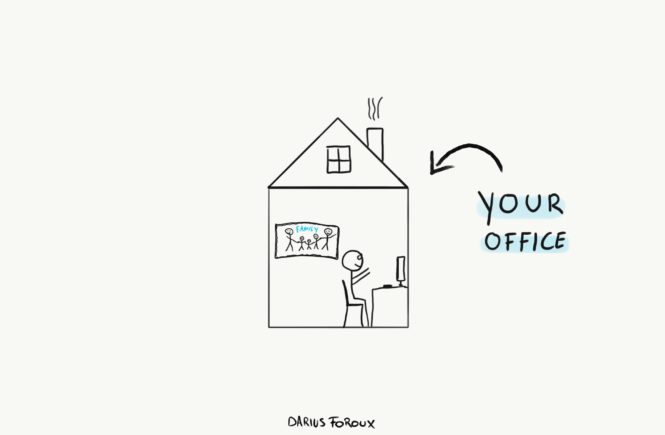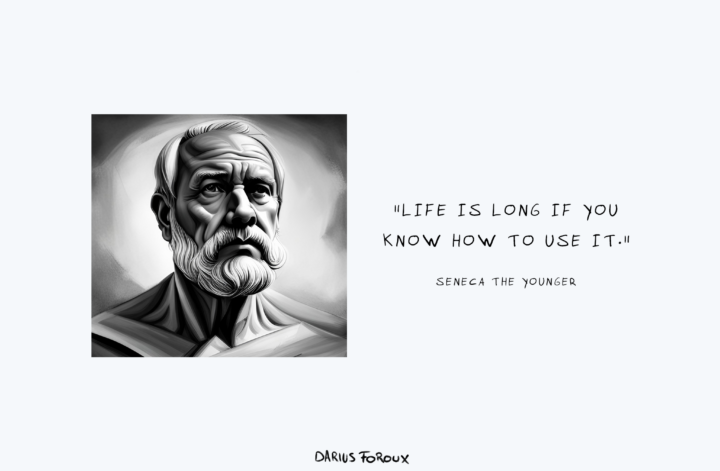I started my online career in 2015, after quitting my 9 to 5 in London. The office politics, the crappy lifestyle, and the lack of freedom and purpose were too much to bear. I wanted to do something I genuinely cared about; something that was mine.
The first 1-2 years of my online career were not spectacular. I didn’t become a millionaire or anything. But eventually, my online business grew to provide a high six-figure sustainable income. I also learned a lot of skills and strategies along the way.
Some time ago, at the height of the pandemic, a concerned reader emailed me about the current state of the economy. The reader was curious: How could they work from home and build a profitable online career?
“I’d like to transition into building a career online,” the reader said. “There’s so much on my mind and things are not getting easier. Can you share your tips for starting an online business/career?”
Back then, lots of people were going into quarantine because of the novel Coronavirus. It’s been over 3 years now, but that reader’s email is still relevant today. That’s the thing with the present world: There is always disruption in the form of wars, new technologies, diseases, etc.
Uncertainty is a natural part of life. We can’t afford to only have one income stream because freedom is all about having options. That’s why building an online career or side business is so important.
Many folks have attempted to build a profitable online career. But most of them failed. Data shows that around 90% of new online businesses fail after just 4 months!1Source: Entrepreneur
I’ve seen a bunch of social media influencers who make it seem like building an online career is a breeze. “Just become an influencer/blogger/vlogger/life coach like me and you’ll make big money in no time!” So I’ll be honest with you: Building a profitable online career is hard.
BUT it’s also not rocket science. As long as you’re equipped with the right skills and strategies, you’ll eventually grow your income and freedom over time.
Before I get to the steps I took to build an online career, I’d like to share a few quick thoughts:
- It’s never too late. Sure, it would’ve been great if you were one of the pioneer influencers on social media. Or if you got into blogging when there weren’t millions of blogs on the internet yet. And so forth. These are all excuses to not take action. The best day to start is today!
- Get-rich-quick schemes or hacks don’t work. If you look hard enough, you’ll probably find a few people who built an app in 24 hours and became rich. But I wouldn’t count on that. And you likely also wouldn’t. So adjust your expectations.
- There are no “secrets.” If there were secret blueprints to making millions, they would remain secret. If I had a secret way to make a lot of money, I would keep it secret. That’s the truth.
- What works for me, might not work for you. And vice versa. So don’t just listen to a single person. Instead, take in the information and think about how you can apply it to yourself.
- You only need a laptop. Maybe you’ll need a camera and microphone if you want to create videos, but that’s not even necessary. Everything I share in this article works if you want to make money from home or any other place.
- This is not a “50 freelance online jobs that will make you rich” type of article. Those articles are useless. Instead of finding jobs, build a career. I’ll talk about that in Step 1.
That’s it. You certainly can build an online career. If the thought ever came up, it means you probably have it in you. Let’s get started.
Step 1: Identify your key skills
If you keep chasing jobs and gigs, you will become a person who’s hired based on completing a task. That’s the definition of a job. Someone hires you to do something they tell you to do.
Instead, build a career. The difference is that you’re no longer compensated to complete a task (or multiple tasks), but you’re compensated based on the value you provide.
This is the #1 business lesson I’ve learned from one of the most respected business thinkers of all time, Peter Drucker. I’ve spent 6 years getting two business degrees.
Not once during that time did I learn the following. You build a career based on your skills—things you’re good at. And before you say, I’m not good at anything: You can acquire skills.
Need some inspiration? Here are several income-generating skills that I’m constantly working on (in alphabetical order):
- Communication: We think we’re all master communicators. But the truth is that we suck. Communication is both art and science. Our ability to work with others, to gain repeat clients or customers, depends on it.
- Graphic Design: A basic design knowledge can help you do your own design work. Because an ugly product or packaging is unlikely to be bought. Your designs don’t even have to be perfect, as long as they’re genuine and easy on the eyes.
- Negotiation: You negotiate all the time. With your spouse, kids, parents, teachers, friends, co-workers, managers, etc. Learn to get the best deal for all parties.
- Personal Effectiveness: Learn how to maximize the results you can get during the 16–18 hours you’re awake. Get more done — effectively.
- Persuasion: Learn how to get what you want in an ethical way. It’s true that you can’t make people do anything, but you can be more persuasive in your messaging.
- Writing: We communicate more in the written word, whether through emails, chats, pitches, etc. This skill becomes even more important when you work from home.
The key is to acquire multiple skills. The Dilbert comic artist and author, Scott Adams, once talked about this theory that combining skills you’re decent at results in an exceptional career. You want to figure out your own unique skill stack.
The beauty of this career strategy is that you can do different types of work. You’re not limited to one job. You can do multiple things to earn a living—as long as you’re providing value. Which brings us to…
Step 2: Demonstrate value
When you know what you’re good at, you can work on improving that skill and being one of the best in your field. The better you are at something, the more value you can provide. This makes you stand out from the crowd.
Until this point, I haven’t talked about specific careers. Why? Because the list is endless. In today’s world, we have coaches who help people tidy up their homes. We have people who sell their art online. The opportunities to work from home are endless.
I don’t want to list 50 careers because that’s too limiting. Maybe you’re thinking about doing something new. And you shouldn’t let another person make you pick your future career from a list.
Now, let’s say you’re good at writing and persuasion. You can provide professional copywriting services, start a subscription-based newsletter specializing in improving persuasion skills (or even just a normal newsletter with persuasive content), or even start a blog.
There are two important questions to ask when you’re determining what online career/business to pursue:
“What value can I provide? And how do I show people looking for that value that I’m the best person to get it from?”
That’s the essence of any career. No matter what you pick, the next step is to demonstrate your skills and work. This is the #1 reason I couldn’t get any customers/clients when I started. Like almost everyone else, I only talked about my work, I didn’t show it.
Now, I’m not talking about building a resume and asking for testimonials or endorsements. I’m talking about doing your actual work for people to see.
For example, I’ve published hundreds of free articles. That’s how I demonstrate my skills and provide value. If you do client work, you want to provide value before people hire you. People think it’s the other way around.
I used to think that someone should hire you first, and then, you do the work. That’s what everyone else does. Want to stand out? Give your audience or prospective clients a free sample. There’s nothing new about this.
If you’re old enough, you remember those folks who sold vacuum cleaners door-to-door. They came by and showed you how the product worked. They didn’t ask for your money; they just tried to be helpful. Now, times have changed. But the basic idea behind earning a living is the same.
Demonstrate value. And make it easily visible to the people looking for it.
Step 3: Make it sustainable
At some point, you acquire skills, you get clients, sell products, and services, or do something to provide value, working from home.
Now, it’s time to think about the long-term sustainability of your career. Because the last thing you want is to burn yourself out. And trust me, there’s a big risk that will happen.
Working from home can be lonely. And without some kind of system, you can’t keep it up. You want to avoid exchanging your time for money. Look at it this way: What happens if you stop working for a week?
Do you still have income streams? Or is your income tied to your hours? You want to avoid the latter. You can do that in two ways:
- Delegate. AI has quickly become everyone’s affordable virtual assistant. Nowadays, we can automate a lot of tedious or repetitive tasks. So ensure you’re leveraging this technology when you can. To level things up, you can also hire a remote worker. Remote virtual assistants can help take certain tasks out of your hands so you can focus your energy elsewhere. I’m not talking about hiring someone who schedules meetings or books plane tickets. Instead, hire someone who can do some of your actual work. For example, as a writer, I hired a researcher and editor who has been working with me on pretty much all of my projects for the last 3 years.
- Create products. This is what everyone loves to do. But most people do it for the wrong reasons. I’ve met a lot of people who tried to rush into creating a product. As a result, no one bought it. I do recommend everyone create something scalable. But don’t see it as some kind of magical thing. I have a bunch of products and it still requires work. People make you believe in the “passive income lifestyle.” But that’s nonsense. Passive income streams are hardly ever passive. Most entrepreneurs create products and multiple income streams to diversify. It simply means less risk if you have multiple ways to generate value.
There are a lot of misconceptions about building a career—online or offline. The number one reason there’s so much BS advice on the internet is that we’re impatient.
I’m no different. I’d love to come up with an idea today, work on it tomorrow, and launch it the day after. Also, it would be great if a million people were excited about whatever I launched and they’d come to buy in droves.
That doesn’t happen. But that’s okay. With the right skills and strategy, you can have a long career. Let’s say you’re 40 and you’re committed to working for as long as you can, which is one of the best things you can do in life. You might have another 40 years of work in you! FORTY. Just do the math based on how old you are.
So take your time my friend. With a 40-year horizon, taking 4-5 years to build a foundation of skills is nothing. Here’s one thing that’s sure: You’ll profit from those skills for the rest of your life. Because that’s the only thing people can never take away from you.




